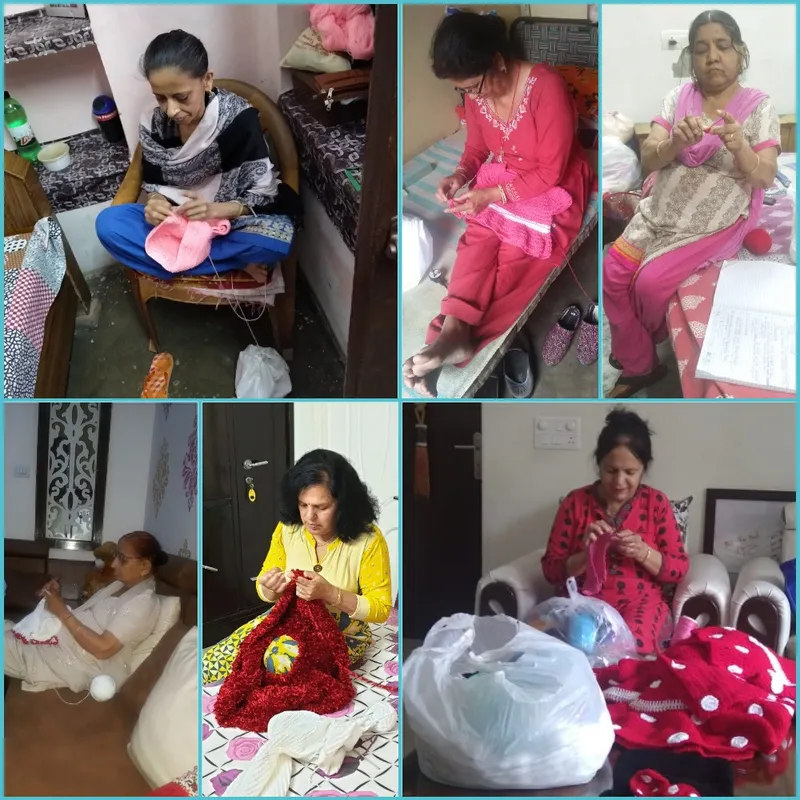How this couple’s crochet business has empowered homemakers and made over 1Cr in revenue
Based in Haryana, crocheted children’s apparel startup Ajoobaa, founded by entrepreneur duo Tarishi Jain and Nivesh Arora operates on B2B and B2C models and has clocked a revenue of Rs 1.4 crore in the financial year ending March 2020.
Like all mothers of daughters, Tarishi Jain wanted to dress up her little one in a variety of clothes. When her baby was around four months old, Tarishi’s mother gifted a “pretty and unique crochet woollen dress.”
This pretty crochet dress paved the way for an idea and later a life-changing moment as Tarishi became an entrepreneur and set up Ajoobaa, an apparel startup. She was later joined by her husband and co-founder Nivesh Arora, a former Amazon employee.

Nivesh Arora and Tarishi Jain, Co-founders, Ajoobaa
The startup specialises in comfortable crochet clothing for children, and was registered in 2018. It saw an annual turnover of Rs 1.4 crore in the financial year ending March 2020 with an 18 percent net profit margin.
The entrepreneurs are now tapping in the children’s clothing market, which was valued at $14.9 billion in 2019, with a large customer base of 375 million population of children below 15 years of age in India, according to market research company imarc group.
Crocheting and financial freedom for women
Tarishi is no stranger to crochet and had designed accessories like table mats when she was younger. She revisited her passion, trying to make crochet dresses for her baby, which were loved by her friends and family members.
“A few enquired if I could make them for their children, but I did not have time or the capacity to do so much. I tried looking for somebody who could make it for me and luckily, found a domestic help in the neighbourhood who was good at it. We worked on some designs and sold them to friends and the orders just kept coming,” she recalls.
Tarishi was still on the lookout for more women who could crochet to meet the growing demand. Soon, the journey became more about helping women gain financial independence. One day, the domestic help she hired offered sweets and informed her she was able to buy a bicycle for her son out of the money she made by crocheting.

Women who are part of the Woonies
“I felt so good that my passion was helping them financially and making them more confident. Soon, I realised this kind of work is usually done by women who didn’t prefer outside work,” she adds.
Today, Tarishi and Nivesh have also launched a brand called Woonie, which is a network of 112 crochet artisans headed by 12 women, who support Ajoobaa’s business.
The artisans can either come to the startup’s warehouse to work or take the raw material and bring the finished product and collect their payment.
While the network is not consciously gender specific, it comprises only one male artisan.
Priced between Rs 149 and Rs 2,000, the startup claims to have over 250 SKUs including frocks, shoes, headbands, and sweaters for children and manages around 250 orders daily.
While crocheted clothes are usually categorised as winter wear, the startup has introduced summer apparel in this segment as well. Besides the startup’s own website, their products are available on various ecommerce platforms like , , Ajio, and . It also caters to B2B retailer clients both in domestic and international markets through platform and India Mart.
Challenges along the way
Tarishi considers herself lucky that she has not faced any gender bias as a woman entrepreneur. However, she says that it was initially difficult to manage a young baby and her venture when her husband Nivesh was engaged in office work.
The duo has now been working together for more than two years and believes that Ajoobaa’s standardisation of the product makes it stand apart from other competitors. However, Nivesh says that achieving this has also been a major challenge.
“Initially, one artisan would make a design and the other would prepare the same but the knitting would be too tight. Then the third person would place the designs in a slightly different place in the garment. So that's when Tarishi started giving marked patterns to the head women and others would follow her lead,” he explains.
Sourcing quality wool was also another challenge but the entrepreneurs have now struck several partnerships with suppliers in Ludhiana.
Some family members of the women artisans were not comfortable with them going out to the warehouse and collecting wool. To address this problem, they appointed field executives to distribute the raw material as and when it was needed.
Started with an initial investment of Rs 2 lakh to now having a turnover of more than Rs 1 crore, this Haryana-based startup hopes to expand by building warehouses in three more cities and is looking to raise funds soon.
Edited by Rekha Balakrishnan









